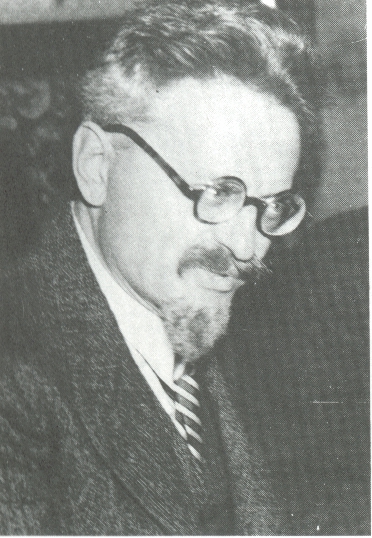

Trotsky, Leon (1879-1940), Russian Marxist theorist and revolutionary, who was one of the principal leaders of the Soviet government until ousted and exiled by his archrival, Joseph Stalin.
Originally named Lev Davidovich Bronstein, Trotsky was born on November 7, 1879, in Kherson Province in Ukraine, the son of Russified Jews. He was educated in Odesa and in Mykolayiv and was a star pupil with enormous intellectual capabilities.
Early Political Life
Trotsky's political involvement began in 1896 in a circle of Mykolayiv Populists, but he soon converted to Marxism. After a brief stay at Odessa University, he returned to Mykolayiv in 1897 to organize the Southern Russian Workers Union. For this he was arrested, jailed, and exiled.
He escaped from Siberian exile in 1902, fleeing to Europe and adopting the pseudonym Trotsky. Abroad he joined Lenin, L. Martov, Georgy Plekhanov, and other Russian Social-Democrats, who were publishing Iskra (The Spark). By vitue of his flair for polemic and oratorical brilliance, he quickly rose in the party.
At the party's Second Congress in 1903 Trotsky opposed Lenin and the Bolsheviks, siding with the Mensheviks. His characteristic independence, however, kept him from cementing any organizational ties. Alone of the major party leaders, he rushed back to Russia to be an active participant in the 1905 Revolution, where he gained practical experience as chairman of the St Petersburg Soviet of Workers Deputies. Jailed in December 1905 and later exiled to Siberia, Trotsky used his time to reconsider the paradoxes of revolution in backward Russia. He synthesized his thoughts in two books, 1905 and Results and Prospects.
Revolutionary Leadership
Escaping from Siberia in 1907, Trotsky spent the next decade defending his ideas and engaging in émigré squabbling. The March Revolution of 1917 caught him by surprise in New York, where he wrote for a Russian newspaper. Trotsky reached Russia in May, quickly assumed leadership of the independent left Social-Democratic Interdistrict Group, and joined the Petrograd (as St Petersburg was renamed) Soviet. Within weeks, he had gained enormous popularity as the most eloquent agitator of the Soviet left. In July, after being courted by Lenin, he joined the Bolshevik party and was elected to its Central Committee.
As a Bolshevik, Trotsky was elected chairman of the Soviet in September. He sided with Lenin on the need to overthrow the provisional government and devoted all his energies to marshalling support for the armed uprising of the Bolsheviks. With Lenin in hiding, Trotsky was the general in charge, and he successfully directed the masses of workers and soldiers in the November Revolution.
In the ensuing Soviet government Trotsky first became commissar of foreign affairs, negotiating a separate peace with Germany at Brest-Litovsk. Later, as a ruthlessly practical commissar of war, he is credited with creating, inspiring, and directing the Red Army that gained a great victory in the civil war and saved the Revolution.
Exile
Trotsky was second only to Lenin in the Politburo, and Lenin viewed him as exceptionally able. He backed Lenin's major policy innovations, but had his own plans for industrializing Russia. When a stroke removed Lenin from active politics in May 1922, Trotsky was not in a position to take over. Never particularly adept at party politics, he failed to outmanoeuvre the troika of Grigory Zinovyev, Lev Kamenev, and Stalin that took power. Although he put himself at the head of a loosely knit left opposition, Trotsky's polemic salvos were no match for Stalin's bureaucratic party machine. In 1925 his adversaries removed him from the Commissariat of War; in 1926 they expelled him from the Politburo; and in 1928 Stalin exiled him to Central Asia. In 1929 he was expelled from the Union of Soviet Socialist Republics.
Trotsky spent the rest of his life seeking a safe place to compose his savage critiques of Stalinist Russia. In Turkey, France, Norway, and finally Mexico he produced a flood of publications, including an autobiography, My Life (1930; trans. 1930); an unmatched History of the Russian Revolution (3 vols., 1931-1933; trans. 1932-1933); The Revolution Betrayed (1937); and powerful articles on the major issues of his day (Stalinism, Nazism, fascism, the Spanish Civil War). A Stalinist agent fatally wounded Trotsky on August 20, 1940, in Coyoacán, Mexico. He died the following day.
Trotsky's brilliant polemical and oratorical talents were perfectly suited to a period of revolution: his energies helped to create, and above all, to save the Soviet Union during the civil war. Lacking the skills of a political infighter, however, he lost out to Stalin. Soviet scholars still held to the Stalinist line that Trotsky was a traitor, who attempted to undermine the Soviet Union.